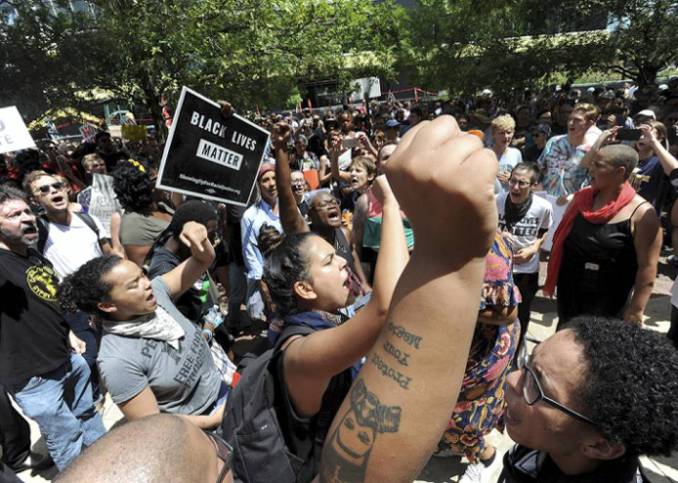On August 14, 2017, two days after a white supremacist murdered Heather Heyer in Charlottesville, VA, Durham, NC’s Confederate monument was toppled in an act of collective courage. Four days later, on August 18, reports spread across Durham of the KKK’s impending arrival. Materially and ethically prepared to defend my city against racist violence, I went downtown to aid my friends, equipped with my rifle. Residents of Durham, many of whom had never participated in direct action before, showed up organically to oppose the Klan and to look out for one another.
I was in Charlottesville. Only six days later in Durham, I was extremely aware of the risks all of us were taking by being in a public space. Knowing how vulnerable we were to racist violence like what I’d witnessed in Charlottesville, I helped to mobilize people for their own communal defense. People voluntarily blocked off the street with their bodies and formed a secure perimeter, ensuring the safety of the community opposing the Klan. Over 1,000 people participated in a day-long show of direct resistance, demonstrating the power of trust and radical solidarity with one another and a shared ethics. My armed actions only accounted for a small part of that event. What makes the day so profoundly compelling is the shared ethical commitment we all had to one another as we deployed a wide diversity of tactics in one of the largest mobilizations in the city’s history.
I am now facing two weapons misdemeanors. I have refused a plea deal from the district attorney and am taking this to trial, bringing our struggle from the streets to the courts. I carried out my actions because of and with the support of the people around me, the community I am accountable to.
My actions build directly from the fierce examples of the queer, Black, trans, immigrant, Latinx, and Asian-American comrades now facing trial for the alleged destruction of the Confederate statue. My actions are also part of a long lineage of people dedicated to the direct, armed defense of others and unflinching defiance of white supremacy, often right here in North Carolina. They risked their lives for their beliefs and their communities and successfully stood against the combined forces of the state and the Klan. Some have lost their lives in this endeavor. Durham does not forget them, and we celebrate their fight by continuing it daily and by any means necessary.
We need to nurture our collective courage to put our jobs, our reputations, our legal status, and even our lives on the line for the freedom of every single one of us. We can no longer constrain our desire for liberty within the abstract bounds of liberal discourse and polite debate. We now have to organize and fight as if our lives depend on it. For indeed they do.
Dwayne Dixon
